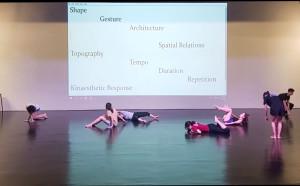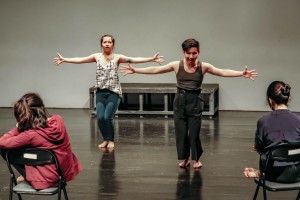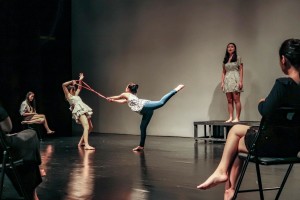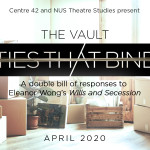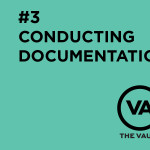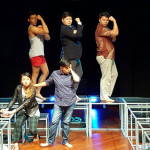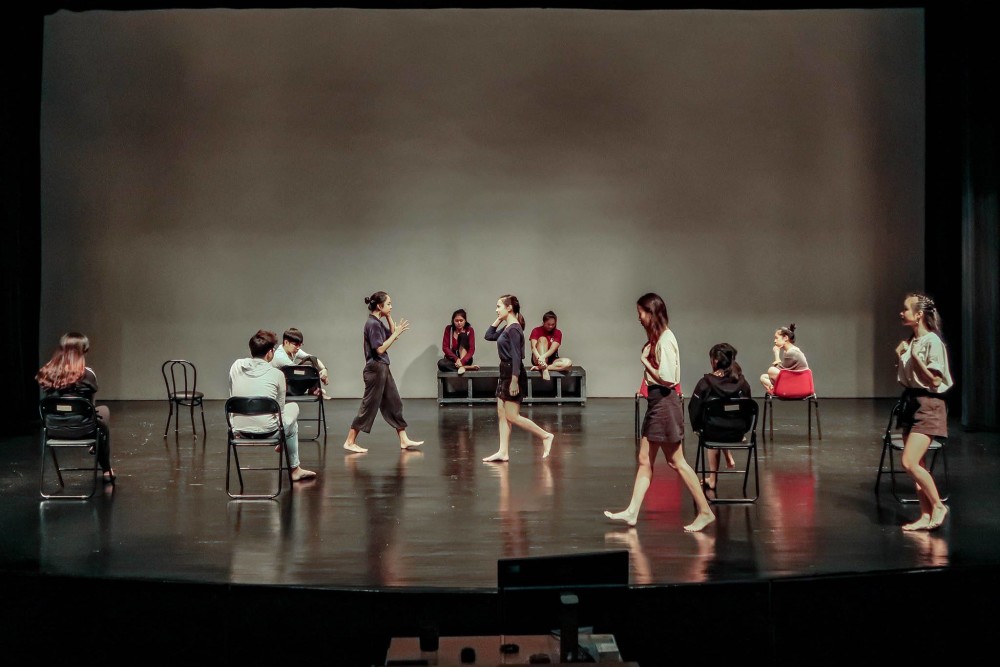
GEL, one of the responses to Eleanor Wong’s Wills and Secession in The Vault: Ties That Bind presenting their work-in-progress on 3 April 2020.
It is a reassuring thing to hear Dr. Robin Loon declare to his class of TS3103 Theatre Lab: “If that’s what you want, just go for it!” His usual endearing and flamboyant manner makes me chuckle just a little, but the words are worth their weight in gold.
I am observing a TS3103 Theatre Lab lesson today. It is strange but comforting being back here, 2 years since I took the module as a Theatre Studies (TS) major at National University of Singapore.
TS3103 is a compulsory final-year project of the TS programme that culminates in a public presentation. This year, the students of TS3103 Theatre Lab present The Vault: Ties That Bind which responds to Eleanor Wong’s Wills and Secession. The work comprises two original performance responses: GEL and Old Lines New Meanings. The former explores relationships between lovers, friends and sisters, while the latter is about a protagonist named Grace, who is forced to choose between her faith and sexuality.
I am immediately struck by the level of independence the students are given in this class, with the module facilitators Robin Loon and Nora Samosir taking a step back, only asking questions, giving suggestions, and… maybe yelling reassurances all around.
It is a very different kind of creative environment than I am used to seeing from TS3103.
You see, in 2018, the Theatre Lab I experienced was markedly different, having just been revamped. Prior to that, TS3103 was known as “Play Production”. Students would have the privilege of working with a professional theatre director on a production that was meant to be a culmination of their three years of learning in the TS curriculum.
However, Robin, who is also the current Module Chair for TS3103, explains that the format was misaligned with the pedagogy of the programme. “We expect the students to do their own production and publicity work and they’ve never really been taught that. And suddenly a director is going to come in and help them accomplish it in 13 weeks. It’s unfair. ” he admits.
So, in 2018, TS3103 was repositioned as “Theatre Lab”, with a stronger experimental and research angle to alleviate the unfair expectations. Despite this, Theatre Lab’s metamorphosis was stuttering and incomplete. In its transition, it had new elements of rigorous research but still upheld the expectations of a ticket-selling production that was helmed by a guest director.
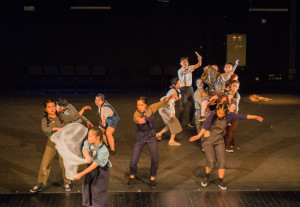
In the first iteration of TS3103 Theatre Lab in 2018, Hana 花 was staged at the UCC Theatre. Photo by Yeo Zhi Zheng.
That year, Dr. Ang Gey Pin directed my peers and I to present Hana 花, a public performance at the University Cultural Centre Theatre. It was a rigorous process of studying and replicating the greats like Meyerhold and Zeami, a medley of theatre legacy and one that offered great insight to Gey Pin’s vibrant practice. However, the curation and direction of the work was also ultimately hers.
The module continued to evolve. By 2019, TS3103 found that its objectives aligned with Centre 42’s The Vault. A new collaboration between NUS Theatre Studies and Centre 42 emerged.
The Vault encourages critical and personal contemporary responses to Singapore theatre history and invites engagement with texts and contexts in a variety of presentation modes. Similarly in Theatre Lab, students are highly encouraged to develop complex and innovative theatrical responses in a research lab practice project, evaluated mainly on its research acumen and not only on its artistry.
There was another major change: for the first time since 1994, the role of the director would be replaced by a dramaturg. The responses would be driven entirely by students. In 2019, this new way of working was piloted, and NUS Theatre Studies and Centre 42 presented The Vault: Gossip, Symphony and Other Matters, responding to Robert Yeo’s One Year Back Home.
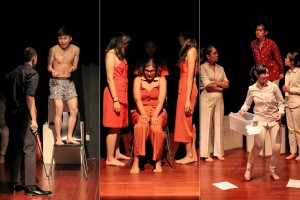
The Vault: Gossip, Symphony and Other Matters (2019) comprised three performance responses: Symphony 404, What Matters and Gossip GRLs.
I was thrilled for my juniors. Officially, it is an alignment of objectives, bridging pedagogy and practice. But the response is also a fitting way to reinsert the voice of the student collaborator into the process.
In fact, self-directed learning and personal voice became central to the idea of response in Theatre Lab.
“I want to see point of view; I want to see insight,” Robin says of the modality. “You could do a very accurate staging of a text with fabulous production values, but if there’s no added point of view, you’re just re-staging it.”
For Robin, who is also a co-founder of Centre 42, this method of response benefits not only the students, but the cultural landscape at large. “It is my belief, and one of the driving beliefs behind Centre 42 that we can do a lot more with our cultural capital than to just bury it, or to put it into a museum,” he says. “We can sharpen our creativity and respond to it. We can create new works.”
I understand the urgent fervour behind his words; it is the same sense of agency I craved while fulfilling my own Theatre Lab. I find myself wondering if that was the reason why two months after Hana concluded in April 2018, it felt liberating to present my own brainchild, The Vault: @thisisemeraldgirl, on my own terms. Was it because it felt like I had a voice and point of view too? And that the format of the response helped me be conversant with theatre legacy, rather than a being tool to replicate it?
Now as I follow the developments of 2020’s Theatre Lab for The Vault: Ties That Bind, I notice the very same sense of agency in motion, as evidenced by Robin’s encouragement to “ just go for it!”.
But agency is more than just about handing over the reins altogether. Like a laboratory, the conditions have to be right in order for creative and empowering fissions to take place. And the scaffold within which the students are allowed to freely experiment is perhaps Theatre Lab’s greatest strength, boosted in part by the rigorous demands of the module, which spans just 13 weeks.
A Laboratory Experience
In January 2020, the students of TS3103 Theatre Lab attended specially curated workshops in Sukuzi and Viewpoints training. They then responded to Wills and Secession in a series of idea pitches. Over the next few weeks, the students were given six opportunities to present their developing works, of which, two are assessed. During these sessions, Robin—the dramaturg—and Nora—the producer—would question, critique and advise the students on their research process, aesthetic choices and next steps.
It is a robust and intensive experience supervised by Robin and Nora that demands accountability, but gives students a safe space within which to work independently.
“Dr. Loon and Ms. Nora made the work-in-progress drafts a very resonant point,” says Dennis Chen from Old Lines New Meanings (2020). “They always say, ‘Just show us your work, then you can edit and discuss.’ It’s like a spine, so that we won’t be afraid, and we can try whatever we want.”
The testing bed allows students to constantly rejig their experiments and craft their own research parameters, justifying or even rejecting options on their own terms.
I see this especially strongly in the groups’ work-in-progress presentations, where the students often defend their decisions against the provocations from their teachers by offering reasoning, or even counter-proposals.
In Old Lines New Meanings, Allen is the straight brother of the queer protagonist while Leslie is her gay best friend. Jedidiah Huang, who is part of the group, says, “Dr. Loon once suggested we explore a scene with Allen and Leslie in it. But we decided not to because their masculinity would have been the most obvious trait, and we didn’t want to explore masculinity.”
“Our focus was on interrogating the notion of binaries instead, the fact that you’re always seen as either one or the other,” Ella Wee from the same group, explains.
The ability to self-determine is something Robin highly encourages and facilitates as the dramaturg, opting for a more hands-off approach.
“I prompt the students to think about certain things, but I don’t interfere with their work,” he explains. Instead of instructing them, Robin sometimes doles out one of 3 words: edit, clarify and distill. He explains that that prompt alone is sufficient because the students can recognise how to proceed.
“”Edit, clarify and distill” can mean anything, but it needs to be specific and tailored to the process. The students understand instinctively and kinaesthetically—not just cognitively—what it means, because they’ve gone through the process,” Robin adds.
It nearly flies over my head, so I shoot him a disbelieving look. But then, he asks that I assess my own recent works with the same three words—and I understand intuitively how it works.
The prompts point to three types of general actions the group may adopt: to edit, such as to rearrange or to cut; to make clear, and to concentrate. There are a myriad of ways to interpret and implement the actions depending on the work, but the best choice of how, is always theirs.
“These are all refinement keywords. It’s one of the things that I feel a dramaturg will use without being too interventionist,” Robin explains.
I am beginning to see how the various elements come together to support the students, forming a safe space for their own creativity to take centre stage.
Granted, making theatre is not always refined or straightforward; it cannot always be contained. The creative fissions are often messy and elusive, sometimes even unkind, but the students prove that the laboratory framework facilitates deep inquiry, while still encouraging creative problem-solving and spontaneity.
“Our process involves a lot of interrogation,” says Dennis. “ Somebody will give an idea and I’ll go, “but why?” and we’ll keep pushing, saying “no, that’s not strong”, or “that’s okay, but why?””
It is a good way to keep the work rigourous and insightful, but the group sheepishly admits to “spiralling” very often as a result. They ended up developing sensitivity to these moments of obsession and frustration, and figured a way to break it with the phrase: “let’s just game this”.
“When we need to snap out of overthinking, we play theatre games because they are a good way to just trust the process,” says Ella. “Games also help us to find and shape impulse, a starting point to put a structure to instincts,” Dennis adds.
I’m heartened to learn that the group balances this combination of structure and spontaneity to push their ideas forward, but I also notice that there is an air of steely determination and stubborn refusal to settle for less when it comes to devising work.
When I point this out, they agree in unison. They explain that there is a certain satisfaction in problem-solving for the stage.
““That’s too easy” is something we say a lot. It’s a very common and valid criticism in our process.” Ella says. “If we don’t push it, it can get boring.”
It is exciting to see the students develop their own methodology and philosophies to their work, when given the right space and guidance to pursue it. Robin too, is understandably thrilled at the creative and pedagogical possibilities that arise every year in TS3103. “So much of our education system is about fulfilling certain assessment criteria. This is no exception. But I want to empower students to control and direct their own learning, so that it will stick with them,” he says.
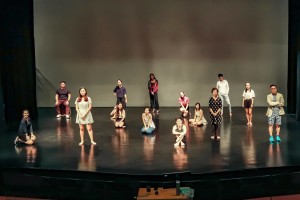
The class of TS3103 Theatre Lab 2020, The Vault: Ties That Bind, with technical director Henrik Cheng, producer Nora Samosir and dramaturg Robin Loon.
“At the end of the day, it’s all theirs. The work, the thinking, it’s all theirs. And no one can take it away from them.”
Sure, the laboratory framework creates a safe and rigourous environment for exploration, and the modality of the response makes the process self-directed and insightful, but all these allow for the students to make their own discoveries, through problem-solving and peer-to-peer instruction, enabling a strong sense of agency and confidence.
As a senior looking back upon the journey of the same name that I once embarked on, I recognise that TS3103 has become a whole new beast, with needs for a very different time. And while there is a new way to the module, there is no perfect method to it. Yet, one thing that has remained constant through the years is the desire of every batch to make good of their time in Theatre Studies with one final hurrah, because even though it bookends the curriculum, perhaps TS3103 is ultimately not just about what students have done, but what they can do.
By Lee Shu Yu
Published 13 May 2020
At the time of the interviews in March 2020, The Vault: Ties that Bind was slated for a public showcase at Teater Ekamatra’s Greymatter on 18 April 2020, but was cancelled due to the COVID-19 outbreak. As the situation escalated, so did the national measures. Eventually, the students evolved and presented their performances in a private Zoom session for their class assessment on 17 April 2020.
On 10 May 2020, NUS Theatre Studies and Centre 42 presented the Zoom watch party of The Vault: Ties That Bind. The Zoom presentation is now available for public viewing, along with a series of documentation materials, such as the timeline of developments in light of the COVID-19 situation. For more information, please visit click here.

